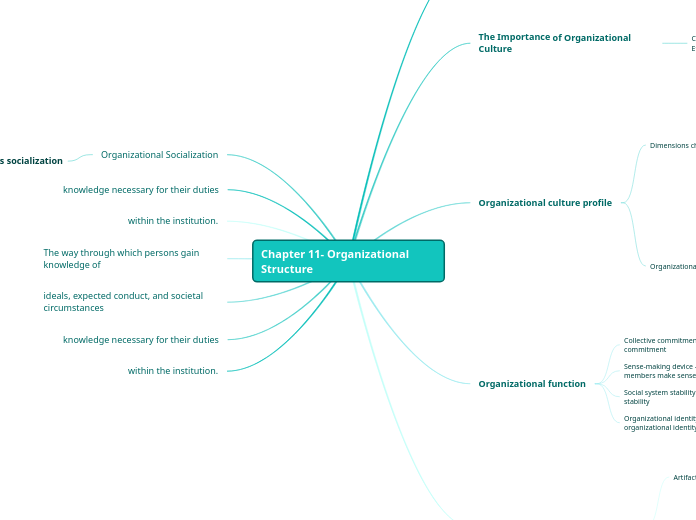Chapter 11- Organizational Structure
Strengthening Organizational Culture
Introducing culturally consistent rewards
Aligning Artifacts
Actions of founders and leaders
Attracting, selecting and socializing employees
External contraction is selling off elements of the firm
The Importance of Organizational Culture
Contigencies of Organizational Culture & Effectiveness
Ensure culture-environment fit
Avoid strength to level of corporate cult
Cults restrict mental models, suppress subcultures
Create an adaptive culture
External focus, process focus, ownership, proactive
Organizational culture profile
Dimensions characteristics
Experimenting, opportunity seeking, risk taking, few rules, low cautiousness
Predictability, security, rule-oriented
Fairness, tolerance
Action oriented, high expectations, results oriented
Precise, analytic
Collaboration, people-oriented
Competitive, low emphasis on social responsibility
Organizational Culture Dimensions
Team orientation
Attention to detail
Innovation
Stability
Respect for people
Outcome orientation
Aggressiveness
Organizational function
Collective commitment -Facilitate collective commitment
Sense-making device -Shape behavior by helping members make sense of their surroundings
Social system stability - Promote social system stability
Organizational identity - Give members an organizational identity
Elements of Organizational culture
Artifacts of organizational culture
Physical structure
Language
Rituals and ceremonies
Stories and legends
Organizational culture
Shared values
-Conscious beliefs
-Evaluate what is good or bad, right or wrong
Shared assumptions
-Unconscious,taken for granted beliefs
-Implicit mental models,idea protoypes of behaviour
Organizational Socialization
Stages socialization
